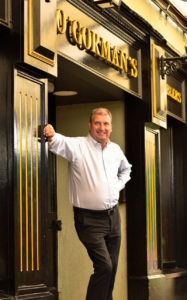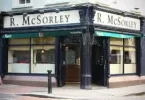Rates among the ruins
As part of the ongoing National Revaluation Programme local authorities around the country revalue commercial properties for the assessment of business rates county-by-county. Rates go to fund all activities of the local authority.
The last General Revaluation was undertaken over 100 years ago.
The method of valuation adopted by the Valuation Office had lost contact with market values and the purpose of the revaluation was to bring valuations back in line with current market conditions.
But while some counties still await this important revaluation others, it seems, are being revalued a second time.
And while some receive a reduced bill, others – having invested heavily in renovating their pub in an otherwise seemingly derelict town centre environment – find themselves lumbered with a revaluation that’s led to higher rates demands.
As a result, many complain that at a time when towns around the country are not being managed satisfactorily by their local councils their premises are being hit for higher commercial rates.
It’s frustrating.
Donal O’Gorman runs two pubs in Portloaise: O’Gormans and The Bog Road. His main complaint is the way the Valuation Office changed pubs’ assessment from square footage to turnover.
“This sector is one of the only ones – if not the only one – subject to this change,” he told Drinks Industry Ireland, “I disagree with it because my rates have doubled from €12,000 to €24,000 since the change was made.
“I’ve no problem with paying rates but there should be a cut-off point where I get the benefit of employing a few more people and they get their increase in rates so that the businessperson sees a small bit of benefit to themselves as well, instead of walking out with less profit at the end of the day.”
Rateable Valuation Consultant Eamonn O’Kennedy points out, “The Valuation Office can justify this by pointing out that for shops, offices and industrial premises the larger the floor area the higher the rent that will be achieved. This however does not apply to pubs in general as sale and letting price depend more on turnover than floor area”.
True, a licensed premises’ rates bill now depends on a number of factors including the outlet’s turnover but turnover takes no account of the amount of mortgage still to be repaid or the cost of the lease on the premises.
The publican however should be entitled to bring other issues into consideration such as the trading expertise level and the difficulty in trading if the area around the premises has been allowed to become run-down believes Eamonn.
“In general I would argue that the accounts basis is a fairer way to value licensed premises,” he explained, “In my appeals and negotiations with the officials from the Valuation Office over the years I’ve argued that many licensed premises with large floor areas had many areas that were only in use at the weekend – especially first floor lounges.”
What’s more, these large unused areas result in additional overheads with higher insurance, heating and general repair costs.

Donal O’Gorman runs two pubs in Portloaise: O’Gormans and The Bog Road. His rates have doubled from €12,000 to €24,000 since the change was made.
Shouldering the burden
Many also now believe that they’re paying for the non-payment of rates by others with less than 80% of the total rates bill due being collected each year.
Unlike overheads and payroll costs – which can be tackled – rates remain an immutable financial drain on a business.
And reassessment remains a priority for many pubs still working to an old valuation.
For some time VFI President Padraic McGann has been trying to help his members tackle the scourge of the lack of revaluation or upwardly mobile revaluations.
“Before becoming VFI President I worked hard on securing a fair outcome on the rates issue on behalf of members,” he stated recently, “I have strongly advocated to Government that the revaluation programme is of huge benefit to smaller publicans but the rollout of the scheme is painfully slow.
“South Dublin was the first county to be revaluated in 2008, Fingal was next in 2010, but six counties have yet to be processed. The plan is for these counties to be completed by 2021, a full 13 years after the revaluation programme commenced.
“In fact South Dublin and Fingal will receive their second revaluation before counties like Donegal and Galway receive their first.
“This is unfortunate to say the least and extremely unfair on publicans in these counties. We worked out that the revaluation of commercial rates would result in 10% of VFI members experiencing significant increases, 20% would remain the same while a whopping 70% of our members would receive reductions. “In the context of such large numbers of members securing reductions, the foot-dragging on behalf of the Commissioner of Valuation is troubling.”
The Federation’s Chief Executive Padraig Cribben told Drinks Industry Ireland that the 2001/2 Valuation Act envisaged that every pub in the country would be revisited within a 10-year period.
“Dublin took seven or eight years alone while the first county outside Dublin to be revalued was Waterford,” he said, “Traditionally, rates are carried out on the basis of square footage area and the business itself. But in the pub trade, a new scenario links it to turnover.”
Waterford’s figures from 2011 show that the trade was not in a great place back then. So when it was revalued about 65% of pubs saw a reduction in rates, a small percentage saw an increase and 15% saw no change, he said.
“It’s been working its way through the country since then based on different starting points. Limerick may not have been revalued that year.
“Coming into effect on January 1st 2020, Louth, Meath etc are to be revalued based on 2017 figures.
“There appear to be less seeing a reduction and more seeing an increase based on turnover which has increased.”
And six counties remain untouched: Donegal, Galway, Clare, Kerry, Cork and Mayo.
The due date for these is 1st January 2022, he says.
“Because of the 10-year rule the Valuation Office is back doing South Dublin and Fingal again.
“It’s a mixed bag at this stage; where turnover is high people are probably seeing an increase in rates. But some of the outlets may not have been revalued since ’88 – unless Planning Permission was applied for, which triggers automatic revaluation.”
Dereliction & rates
Many outlets around the country have expressed a feeling of frustration that those still in business in towns that have become derelict are expected to shoulder the rates burden for those that have not remained viable. Others are frustrated that higher rateable valuations have been dumped on them following refurbishment work conducted to try and stay in business.
“The rates are a tax on business,” believes Padraig Cribben, “There was a time when you paid your Rates and got refuse and water services for that. Now, you pay for these separately with ‘water-in/water-out’ so in terms of comparisons it’s all add-on costs on businesses.
“Particularly in rural Ireland where premises are closing, the shortfall in tax seems to have to be taken up by the remaining rates payers.”
Once there was a broad span of industries on the Alliance for Affordable Rates (the Irish Employers For Affordable Rates) which led to the revaluation process.
“It’s still having favourable effects on quite a few of our members, but not all of them,” said Padraig who pointed out that some rates assessments date back to 1988 and other members can’t remember the last time they were revalued.
Dublin pubs
There’s no doubt rates are a high fixed cost for Dublin pubs too with many finding themselves in the €25,000-€30,000 bracket annually and with large pubs paying substantially more.
But all in all, the revaluation process has been acceptable for the most part for pubs in Dublin with around two-thirds facing similar or lower rates bills while the remainder face higher rates; but many of the latter have not been revalued for a number of years anyway.
However the Licensed Vintners Association has expressed concern that many councils are increasing their valuation multipliers to make up any shortfall and this can have a serious cost impact too.
“It’s seriously unfair that local councillors can vote to increase the multiplier on all commercial rate-payers,” commented LVA Chief Executive Donall O’Keeffe, “Businesses are significant funders of councils’ budgets while, at the same time, voting to reduce the private home property tax by up to 15%.”
Eamonn O’Kennedy has acted for over 500 licensed premises over the past 30 years and while he still differs with the Valuation Offices on some issues, he believes that it has taken many points into consideration and that the present system is much improved.
The publican’s rates bill is not based on Valuation alone, he points out.
“The rates bill is calculated by multiplying valuation by a multiplier which varies with each local authority,” he explains, “This was formerly known as ‘rate in the pound’. There have been examples where I’ve agreed large reductions in valuation for publicans but due to the increase in multiplier fixed by local authority the reduction in rates was almost reduced to nil. It seems unfair to me that where valuations are reduced a local authority can retain the same revenue by increasing their multiplier.
“If a publican has a drop in turnover he has to cut his outgoings to stay in business; I don’t see why the local authority shouldn’t have to do the same.”

Eamonn O’Kennedy has acted for over 500 licensed premises over the past 30 years and while he still differs with the Valuation Offices on some issues, he believes that it has taken many points into consideration and that the present system is much improved.
Turnover considerations
Eamonn’s main differences with the Valuation Office lie not with the use of the accounts basis for assessment but the manner in which they are used. Licensed premises are mainly valued on a percentage of net turnover.
“In my negotiations with the Valuation Office over the years I’ve sought that food be valued at a lower level than drink due to the amount of waste involved with food. In fairness to the Valuation Office it agreed to value food at 2% to 3% below drink levels.
“I’ve also sought that food turnover of €250,000 or less should not be valued at all as they’re run at breakeven or on a loss-making basis. The Valuation Office still differs with me on that issue but it has agreed to have a nil valuation on the first €100,000 of turnover.”
Other considerations
Off-trade turnover is valued by the Commissioner of Valuation at a lower level than on-sales but it’s still valued at too high-a-level in Eamonn’s opinion as gross profit levels in this area are substantially lower than for on-trade sales.
“In the recent revaluations in the Fingal County Council area however the Valuation Office has taken this point more into consideration,” he stated, “I’ve also argued in negotiations with the Valuation Office that it should look beyond a percentage of drink and percentage of food in assessing valuation. There are many premises who’ve above-average overheads such as entertainment, security and insurance costs.
“The Valuation Office has taken these issues into account in negotiations in recent years but in my view more should be allowed for these additional overheads.”
Other issues he’s raised with the Valuation Office in his negotiations include seeking a reduction in turnover figures used to take account of the expertise of publicans in special cases such as where a publican takes over a licensed premises and increases turnover by up to 50%.
“I don’t agree that this property should be valued on turnover without making an allowance for this expertise.
“Another problem arises under the General Revaluation in that once your area is revalued it’s almost impossible to get your property revalued in the meantime. There can be many reasons where a property can decline seriously in the 10-year period but if the structure remains the same the Valuation Office will not deal with requests to revalue. There’s a need in my opinion to revisit this issue.”
In all this it’s worth remembering how little the government has done about the insurance crisis and to bear this in mind when considering that it has been quite some time since the Minister of State at the Department of Housing, Planning and Local Government John Paul Phelan proposed that the rates legislation be “reformed” under the Local Government (Rates) Bill 2018.
His proposals, he hoped, would “modernise various enactments governing the powers of local authorities to levy and collect commercial rates”.
And look what has (not) happened since then.









